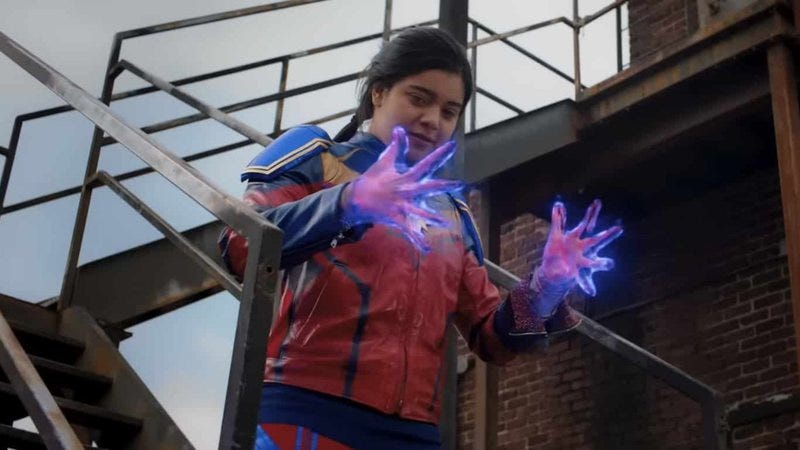Ms. Marvel
The MCU's latest spinoff series on Disney+ is more about how a super-powered teen fits in with her community than battling supervillains or showing off incredible powers.
There’s not a whole lot of the usual superhero stuff in the first two episodes of “Ms. Marvel,” the latest MCU spinoff debuting on Disney+ June 8. That’s all they’re letting critics see ahead of time, but it’s enough to ascertain the flavor and tone of this 6-episode series, with new shows debuting each Wednesday.
You’ve probably heard this is the first Marvel superhero screen outing that features a teen Muslim girl from an immigrant family as the protagonist. That would be Kamala Khan, a Pakistani-American played winningly by Iman Vellani.
As a first-generation native, Kamala is a pretty typical 16-year-old American kid: always online, struggling to fit in at high school, clashing with her traditional parents, crushing heavily on a certain boy, an abject failure on her driving test and uncertain about the path her life is going to take.
She’s also obsessed with superheroes, specifically Captain Marvel. She makes her own costume and is psyched for Avengercon, an upcoming cosplay celebration. Kamala even makes her own weekly animated podcast broadcasting her love for all things super.
(Just five views for her last pod — I can relate.)
If there’s one thing I liked most about “Ms. Marvel,” it’s how the show is reflective of what a world would actually look like if it had real superheroes in it. The brainchild of Pakistani-British comedian/screenwriter Bisha K. Ali, the show is basically one big celebration of fandom, from the Captain Marvel costume contest Kamala is gearing up for to swag emphasizing Captain America’s… uh, celebrated posterior.
Kamala gets to live every fangirl’s dream by turning from stan to super.
There’s admittedly not a whole lot of superpower stuff in the first two outings. Kamala is gifted a bangle (a decorative metal wristband) from her great-grandmother, whose scandalous life back in Pakistan first motivated her mother (Zenobia Shroff) and father (Mohan Kapur) to emigrate to America. This unleashes a strange, uncontrolled ability to morph her body and create luminous objects, such as floating pedestals she can use to walk through the air.
With the help of her best friend, science whiz Bruno (Matt Lintz), they begin secret training to hone her abilities with the hopes of joining the super-folk. Though things are quickly detoured when Kamran (Rish Shah), the mega-cute boy who just started at school, begins to show an interest in Kamala.
I’m guessing a romantic triangle is being set up, with the adoring Bruno harshly friend-zoned.
If there is a distinct heavy who will become Kamala’s main antagonist by revealing themselves, they haven’t yet done so in the early going. Rather, shadowy government agents played by Alysia Reiner and Adaku Ononogbo who become alerted to her emerging powers seem poised to fit the bill — with not a little xenophobic undercurrent to their motives.
There’s also a conflict brewing with Zoe Zimmer (Laurel Marsden), the Instagram star in Kamala’s high school who is first to experience her powers. She actually gives Kamala the hero name she’s initially known by in the media, “Nightlite,” owing to the dreamy, glowing effects of her abilities.
I’m also guessing something key to the storyline will develop with Amir (Saagar Shaikh), Kama’s much-older brother who is about to get married. He’s adjusted well to their parents’ demands for traditional behavior in modern American society, but Kamala’s desire to be just be herself is interpreted by her mom as wicked rebelliousness. Her main objection to Kamala’s superhero fetish is the tight costumes the women wear.
There’s a lot of subtext in “Ms. Marvel” about authentically portraying an “otherized” superhero. Kamala is a Muslim who actively attends mosque — even chattering against some of the old-school traditions like keeping the women in the back — and is very comfortable with her identity. She also resembles a normal kid, not one of these Hollywood actors who starve themselves on crazy diets for six months for action roles, like not being allowed to eat apples.
It’s at once an acknowledgement of real-world resentments and the MCU’s spotty record in being reflective of its fanbase.
“Let’s face it, it’s not the brown girls from Jersey City that save the world,” Kamala quips.
Well, at least that used to be true.
Some may quibble that “Ms. Marvel” is off to a slow start, but from where I sit the show is taking its time to contextualize a very different kind of superhero and let her find her own way to fit into the existing cosmos. I’m ready and waiting to see where Kamala’s heart steers her.





